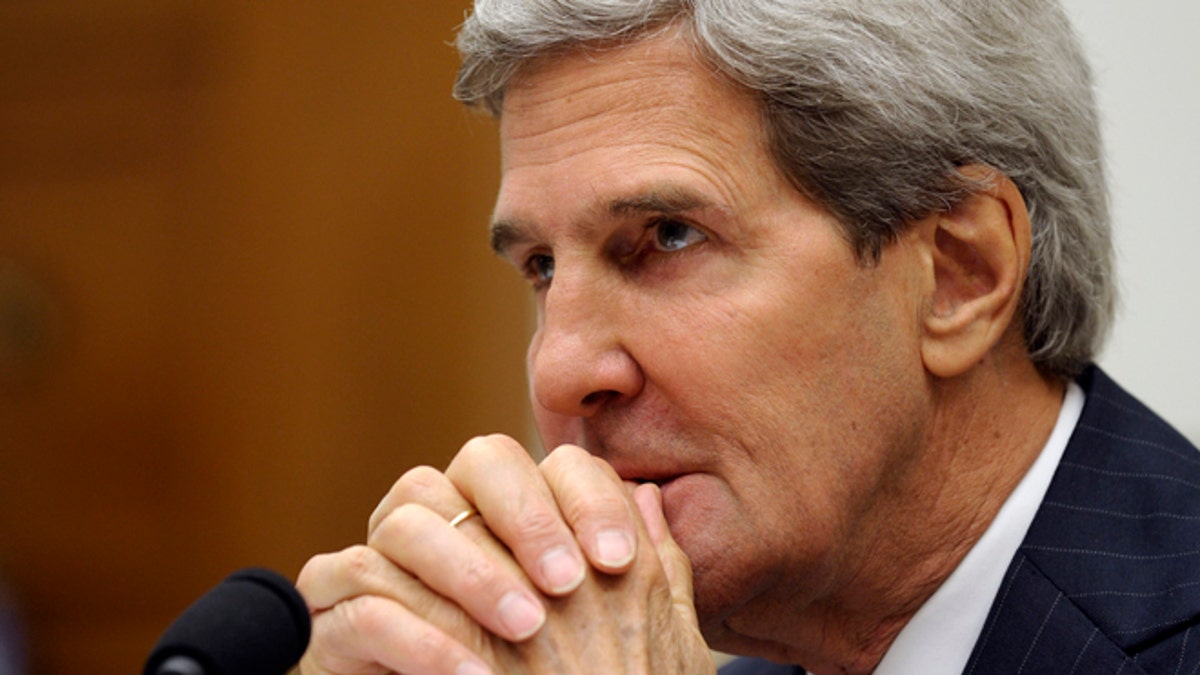
FILE: Sept. 10, 2013: Secretary of State John Kerry waits to testify on Capitol Hill in Washington, D.C. (AP)
Secretary of State John Kerry said Saturday, after reaching a tentative agreement with Russia to disarm Syria of chemical weapons, that his earlier statement about the impossibility of such a plan was in fact “the language of diplomacy.”
“I purposefully made the statements,” Kerry said in Geneva, Switzerland, after reaching the framework of an agreement with Russian Foreign Minister Sergey Lavrov. “And I did indeed say it was impossible and [Syrian President Bashar al-Assad] won't do it, even as I hoped it would be possible and wanted him to do it. And the language of diplomacy sometimes requires that you put things to the test, and we did.”
The comments at a post-agreement press conference were the latest from the Obama administration in an attempt to explain Kerry’s comments Monday in London, after President Obama said Aug. 31 the United States should launch a punitive military strike against the Assad regime for using chemicals weapons, but that he would first seek congressional approval.
The State Department sought to lessen the potential impact of Kerry's comments by calling them a "rhetorical" response to a hypothetical question and not "a proposal." But their importance became more clear as the day progressed.
First, Lavrov seized on what might (or might not) have been Kerry’s off-the-cuff remark.
Appearing in Moscow, alongside his Syrian counterpart, he proposed the chemical weapons turnover and destruction. Syria quickly embraced the idea, and before long U.N. Secretary-General Ban Ki-moon did too.
By that evening, Obama, in interviews with Fox News and five other TV networks, was saying the idea had in fact been brought up in his 20-minute meeting with Russian President Vladimir Putin, on the sidelines of the recent economic summit in St. Petersburg, Russia.
Obama said he directed Kerry to have more conversations with the Russians and "run this to ground."
The president also said he would "absolutely" halt a U.S. military strike if Syria's stockpiles were successfully secured, though he also remained skeptical about Assad's willingness to carry out the steps needed.
"My objective here has always been to deal with a very specific problem," Obama told ABC News. "If we can do that without a military strike, that is overwhelmingly my preference."
Obama wants a punitive strike against the Assad, whom he thinks ordered an Aug. 21 chemical attack that killed nearly 1,500 of his own people -- amid the country’s roughly 2-year-long civil war.
However, a diplomatic solution, regardless of its beginnings, appears to have come at a good time for Obama, considering polls and surveys show Congress, the American public and other world leaders have very limited support for a strike, which would likely consist of missiles launched from U.S. ships in the eastern Mediterranean Sea.
Kerry also said Saturday that he and Lavrov had been talking for three days before his London comments.
“We had two phone calls on the Thursday and Friday before it,” Kerry said. “And I got a phone call very quickly from Sergey saying let's see if we can take this and move, and he talked to his president and they talked -- our presidents talked in St. Petersburg, and the rest is history. We're here.”
The U.S. and Russia reached an agreement Saturday on a framework to secure and destroy Syria's chemical weapons by the mid-2014 and impose U.N. penalties if the Assad government fails to comply.
It remains unclear whether Syria has signed onto the agreement, which requires Damascus to submit a full inventory of its stocks within the next week.
Under the framework agreement, international inspectors would be on the ground in Syria by November. During that month, they would complete their initial assessment and all mixing and filling equipment for chemical weapons is to be destroyed.
Noncompliance by the Assad government or any other party would be referred to the 15-nation U.N. Security Council by the Organization for the Prohibition of Chemical Weapons. That group oversees the Chemical Weapons Convention, which Syria this week agreed to join.
The U.S. and Russia will press for a Security Council resolution enshrining the chemical weapons agreement under Chapter 7 of the U.N. Charter, which can authorize both the use of force and nonmilitary measures.
But Russia, which already has rejected three resolutions on Syria, would be sure to veto military action.
The Associated Press contributed to this report.




